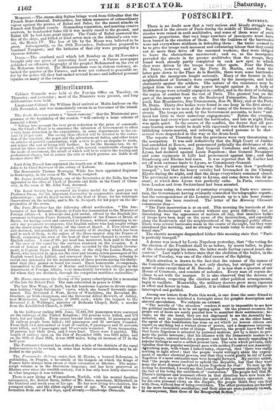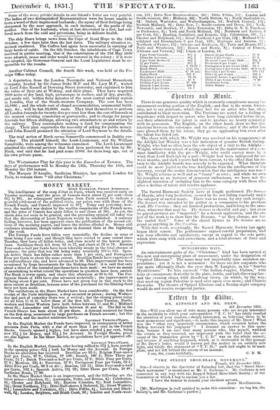POSTSCRIPT.
SATURDAY'.
There is no doubt now that a very serious and bloody straggle was maintained in the streets of Paris during the middle of Thursday. Bar- ricades were raised in such multitude; and some of them ware of such nuiesive proportions, that very large numbers of insurgents must have been busied in the erection of them. But the builders of the barricades wore not everywhere stubborn in defending them : the tactic seemed to be to give the troops such incessant and exhausting labour that they could not do more than drive off the unarmed workers ; they were obliged to leave the obstructions unremoved ; and so, as the insurgents pervaded the streets in far greater multitudes than the troops, they found work already partly completed in each new spot to which they were driven by the troops from other spots. Near the Porte St. Denis, however, and at the Porte St. Martin, and from the latter gate down to the Place de in Bastille, there were some barricades at which the insurgents fought seriously. Many of the houses in the neighbourhood of Tortoni's were occupied by the insurgents, and held obstinately against the soldiers. The nature of the resistance may be judged from the extent of the power brought against it. A body of 50,000 troops were actually engaged in conflict, and in the duty of isolating the region of combat from the rest of Paris. The greatest loss on the part of the insurgents was on the Boulevard Poissoniere, Rue Montor- gueil, Rue Montmartre, Rue Transnonain, Rue St. Mary, and at the Porte St. Denis. Thirty-five bodies were found in one heap in the first street ; and bodies were to be seen at the doers of many of the houses in the other streets. The troops are said, by the Government accounts, to have " suf- fered but little in their numerous engagements." Before the evening, the troops had everywhere carried the barricades, and late at night _Paris was again quiet. In the course of the conflict, the decree that all per- sons bearing arms would be dealt with rigorously was followed by one es- tablishing courts-martial, and ordering all armed persons to be shot : several were despatched in this way at the drum-head.
The reports of Thursday from the provinces were very threatening to the usurpation. It was said definitively that the High Court of Justice had assembled at Rouen, and pronounced judicially the decheance of the President for high treason ; that General Castellane and his army, at Lyons, had declared against Louis Napoleon ; that General Neumayer and some regiments at Lille had pronounced against him ; and that Strasbourg and Rheims had risen. It was reported that M. Culler had set off with extreme haste to Lyons, as Commissary-General.
The news of yesterday morning was that Paris was then "perfectly tranquil" ; but that the heavy cavalry had bivouacked in the Champs Elysee during the night, and that the shops everywhere remained closed. The provincial news related only to Lyons, and came down to the 3d in- stant; at which date Lyons was perfectly calm. In Paris, emissaries from London and from Switzerland had been Quested.
Till noon today, the events of yesterday evening in Paris were uncer- tain, the Government having evidently controlled the telegraphic reports; but the correspondence of the London journals up to a late hour yester- day evening has been received. The letter of the Horning Chronicle commences thus- " The Paris insurrection is at an end. This morning the barricade at the Barriere Rochechouard was carried without any great difficulty ; but so threatening was the appearance of matters all day, that immense bodies of troops have been kept on the scene of the insurrection, and especially along the Boulevards and the neighbourhood of the principal public offices. There were several barricades made in the course of the night, but they were abandoned this morning, and no attempt was made today to make any addi- tional ones."
The electric messages despatched hither this morning state that "Paris is perfectly tranquil."
A decree was issued by Louis Napoleon yesterday, that "the voting for the election of the President shall be as before, by secret ballot, in place of the elector signing his name, the latter mode having caused much dis- content." Last night's letters state that the abolition of the ballot, in the decree of Tuesday, was one of the chief causes of the fighting.
Much attention is drawn to the fact that the reissue of the names of the Consultative Commission is not only shorter, but stripped of every name of note except that of M. Baroche : it is less than a quorum of our House of Commons, and consists of nobodies. Every man of repute de- clines to act with the usurper. It is also observed that the decrees of the President, respecting the election and other political arrangements, begin to 'vacillate. 11 eanwh4 the military decrees grow more rigorous in effect and fiercer in tone. lastly, it is evident that the intelligence is interrupted and garbled.
Among our letters from Paris this week, is one from the same friend to whose pen we were indebted a fortnight since for graphic description and shrewd speculation. We subjoin an extract "The novelty of 'the situation' renders it next to impossible to see how the political machine is to be set agoing again. On the present occasion the people out of doors are sorely puzzled how to manifest their sentiments; be- cause, on the one hand, they are not displeased to see the Assembly hu- miliated, and its unpatriotic tendencies unveiled ; yet on the other hand, the agent of this humiliation has done an at which no honest citizen can regard as anything but a wicked abuse of power, and a dangerous interrup- tion of the constituted order of things. Moreover, the people know full well that Louis Napoleon is actuated by personal motives, not by a desire to pro- mote the public interests ; that his alliance with the Democratic leaders is a hollow league, entered into for a purpose ; and that he is merely appealing to popular feelings to serve a selfish present turn. The calm which prevails, only signifies that thepopular sentiment goes with neither President nor Assembly. Aeworking man, with whom .I talked today, observed, that there was really nothing to fight about; that the people would willingly abide the experi- ment of another electoral process, and that they e ouldgladly by aid of Louis Napoleon if a more estimable man were brought forward.' My ouvricr added, that the people were resolved to uphold the Republic, but that they were none the more disposed to uphold Louis Napoleon for that.' To sum up the feeling be described, I would say that Louis.Napoleon's present strength ay in the fact of his being the antithesis of ' restoration.' Thepeople feel that M. Thiers's intrigues and incessant efforts in that direction have now been de- joue,.and they see in the President the agent of this salutary operation. As for his own personal views on the Empire, the people think they can deal with then:, without fear of being overridden. The other pretenders are backed by far more formidable au rilianes; and their eims are more jealously viewed, in consequence, than those of the Bonapartist faction." Some of the more private details in our friend's letter are very painful. The ladies of two distinguished Representatives were for hours unable to learn a word of their imprisoned husbands; the agony of their feelings being sharpened by the near approach, in each instance, of the perils of the mother. One of the husbands, when at last discovered in a fort, had suf- fered much from the cold and privations, being in delicate health.



























 Previous page
Previous page